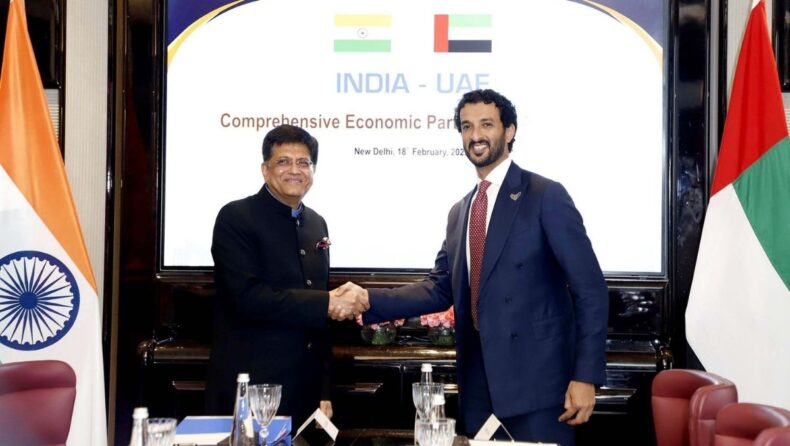India and the United Arab Emirates (UAE) have signed a Comprehensive Economic Partnership Agreement (CEPA) to boost economic trade between the two countries from $60bn to $100 billion in five years.
India’s Minister of Commerce and Industry, Piyush Goyal, talks to Abdulla Bin Touq Al Marri, Minister of Economy of the United Arab Emirates (UAE), during their joint news conference in New Delhi, India on Friday.
The virtual signing ceremony is the first trade deal sealed by the Gulf state since it began pursuing such pacts last September to strengthen its business hub. The agreement marks the beginning of a new phase of strategic cooperation and will open additional avenues of investment and trade for companies in India and the UAE.
The 881-page agreement lifts 80 percent of tariffs on UAE and India goods, while all taxes will be removed within ten years, says the UAE Minister of State for Foreign Trade, Dr. Thani Al Zeyoudi. The deal “is a milestone event in our bilateral relations,” the official Emirati news agency quoted Indian Foreign Minister S. Jaishankar.
India could become the world’s third-largest economy by 2026 if it grows at the same pace, Bloomberg Intelligence and World Bank estimate shows. Under the CEPA, essential UAE commodities that will benefit from the tariff elimination include aluminum, copper, and petrochemicals.
The vital Indian sectors that will benefit are textiles, agriculture, furniture, pharmaceuticals, and engineering, said India’s Minister for Commerce and Industry, Piyush Goyal.
Two pacts related to food security and financial services were also signed between India and New Delhi.
Negotiations included eliminating tariffs and enabling further investment in sectors including hospitality, logistics, construction, and professional services, Mr bin Touq said.
He said it would also promote collaboration in critical future industries such as AgriTech, renewable energy, and advanced technology while providing a platform for small- and medium-sized businesses to expand to new markets.
The deal also encloses services, investments, intellectual property. It also includes a commitment by the UAE to grant 140,000 employment visas to highly skilled workers from India by 2030.
India is the second-largest trading partner of the UAE, where billions of dollars in remittances are sent home by more than three million Indians working in the Gulf state each year.
India is expected to become the world’s fastest-growing economy in 2022, expanding by 9 percent despite continued setbacks by the Covid-19 pandemic, as reported by the International Monetary Fund.
The CEPA is expected to take around 1.5-2 years to be executed. The UAE is pursuing similar trade and investment deals with other nations, including Turkey and South Korea. It expects to finalize bilateral negotiations with Israel and Indonesia shortly.
Al Zeyoudi said that UAE is moving towards becoming a global hub. The partnership will mutually benefit both countries by creating new jobs, promoting foreign direct investment, empowering entrepreneurs, attracting talent, and accelerating the knowledge-driven economies of the two countries, Dr. Al Zeyoudi said at the time.
The geographic proximity of UAE to India, its strategic location providing access to key markets in the GCC and Africa, and the ease of doing business are very lucrative for Indian companies.
India’s large market, on the other hand, the wealth of opportunities across sectors and cost advantages are very lucrative for companies in the UAE.
Published By – Vanshu Mehra
Edited By – Subbuthai Padma













